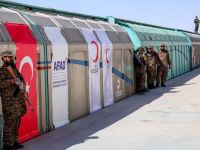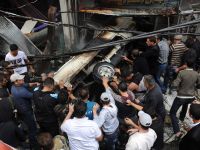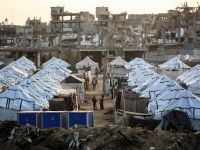The families of Sudanese Muslim worshippers gunned down in a mosque Friday night by an Islamic fundamentalist buried their dead in a mass funeral in their village near Khartoum on Saturday, witnesses said.
Corpses were carried on bedsteads to the unusually busy graveyard in Jarafa, the village where 20 people were killed and around 40 wounded in the attack during prayers at a mosque of the pacifist Ansar al-Sunna sect.
Almost the entire male population of the village turned out to help dig the graves before conducting the religious ceremony, the witnesses said.
Muslims are required to be buried as soon as possible after death under Islamic tradition.
Newspapers said 18 of the bodies had been identified and that the authorities were due to carry out funerals for the other two Muslims, but it was not immediately clear if they were buried in the same funeral.
A police spokesman said a lone gunman, Abbas Abbas of the extremist Takfir wal-Hijra group, burst in on the packed mosque and opened fire with a Kalashnikov automatic rifle while the congregation was "deep in prayer."
But witnesses said there had been a group of gunmen and that bullets had been fired from three directions.
The attack took place during prayers around 9:00 pm (1800 GMT) which were well attended because of the current holy month of Ramadan, when Muslims are required to fast from dawn to dusk.
The police spokesman said Abbas was fatally wounded in an ensuing shootout with security forces.
The Ansar al-Sunna sect has religious differences with the outlawed Takfir wal-Hijra (Atonement and Self-Denial) group which has carried out less serious attacks on the sect's mosques twice before since 1996.
Another attack on a mosque of the Ansar al-Sunna sect in Omdurman in 1994 which also left around 20 dead was not pinned on Takfir wal-Hijra but carried out by an Islamist of Libyan origin who had fought in Afghanistan.
The independent Al-Rai Al-Aam newspaper reported Saturday that Friday's attacker had previously threatened the congregation with an attack similar to the 1994 one.
The mosque's prayer leader, Beshir Ibrahim, told Akhbar Al-Yom newspaper that the assailant was well-known in the village on the outskirts of Omdurman, a suburb of Khartoum, and had broken away from the Ansar al-Sunna.
Takfir wal-Hijra (Atonement and Self-Denial) believes the Islamic law which governs Sudan should be implemented by force, while the pacifist Ansar al-Sunna does not.
The Ansar al-Sunna sect is not connected to any political group in Sudan, but has links with the orthodox Sunni Muslim Wahhabi sect, which has forged a ruling alliance with the Saud royal family in Saudi Arabia.
Friday's attack took place just three days before general elections in Sudan, which are being boycotted by numerous opposition groups, but observers said there was no connection between the attack and the vote for president and parliament – KHARTOUM (AFP)
© 2000 Al Bawaba (www.albawaba.com)







